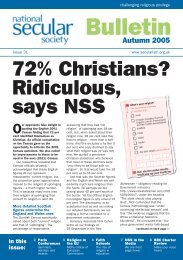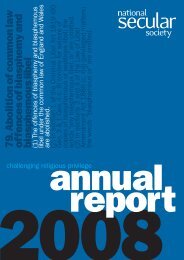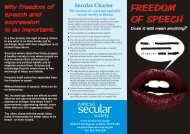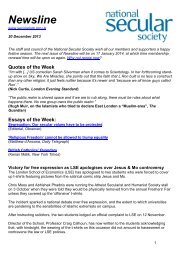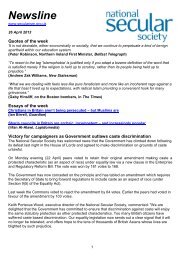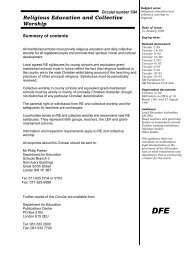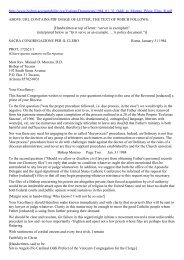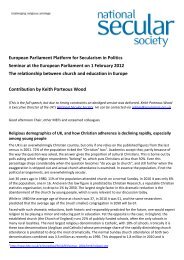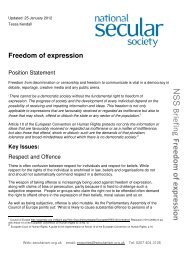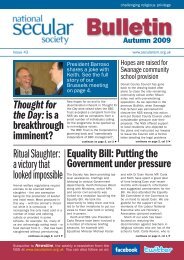NSS Bulletin. - National Secular Society
NSS Bulletin. - National Secular Society
NSS Bulletin. - National Secular Society
You also want an ePaper? Increase the reach of your titles
YUMPU automatically turns print PDFs into web optimized ePapers that Google loves.
Victory for campaign to protect<br />
victims of caste discrimination<br />
The Government is to outlaw<br />
discrimination on grounds<br />
of caste by making caste<br />
an aspect of race under<br />
the 2010 Equality Act. The<br />
decision follows a hard fought<br />
campaign by an alliance of<br />
campaigners including the<br />
<strong>NSS</strong>, which played a leading<br />
role.<br />
The caste system is rooted<br />
in religion and involves the<br />
division of people into social<br />
groups where assignments<br />
of rights are determined<br />
by birth, are fixed and<br />
hereditary. Inequality is at the core<br />
of the caste system.<br />
Initially, the Government had<br />
proposed to tackle the problem<br />
with a wholly inadequate ‘education<br />
programme’ and informal<br />
conciliation service. Given how<br />
ingrained and widespread such<br />
discrimination is, the informal<br />
arrangements would have been<br />
impossible to enforce without<br />
legislation to back them up.<br />
Our bid to make caste a<br />
protected characteristic was<br />
through an amendment to the<br />
flagship Enterprise and Regulatory<br />
Reform Bill. With the end of the<br />
parliamentary session approaching<br />
– when all Bills that have not been<br />
agreed by both Houses of Parliament<br />
fall – the Government came under<br />
intense pressure to concede the<br />
amendment or risk losing the whole<br />
Bill.<br />
In the face of a potentially<br />
damaging third revolt in the House<br />
of Lords it reluctantly conceded<br />
and wording for the Bill was<br />
agreed requiring it to make caste<br />
discrimination unlawful. The <strong>NSS</strong><br />
was the first to announce the<br />
sensational concession.<br />
Caste discrimination has been<br />
found in 21 localities in the UK.<br />
At work it included bullying and<br />
harassment, social exclusion,<br />
recruitment, promotion, task<br />
allocation and dismissal. It extended<br />
to social health care, worship and<br />
politics. These were the findings<br />
included in the report commissioned<br />
by the (previous) Government and<br />
undertaken by the <strong>National</strong> Institute<br />
for Economic and Social Research<br />
Hundreds of British Asians gathered outside Parliament<br />
calling for caste discrimination to be outlawed.<br />
(NIESR).<br />
The <strong>NSS</strong> was partly responsible<br />
for bringing the UK’s failure to<br />
provide statutory protection to<br />
the attention of the UN (we did so<br />
through the International Humanist<br />
and Ethical Union, to whom we are<br />
affiliated).<br />
The UN recommended<br />
“immediate” legislation, but the<br />
Government refused. We therefore<br />
commissioned a legal opinion,<br />
which confirmed that the UK was<br />
obliged in international human<br />
rights law to legislate against caste<br />
discrimination. Our executive<br />
director Keith Porteous Wood<br />
and campaigns manager<br />
Stephen Evans presented<br />
this opinion to senior officials<br />
of Baroness Warsi’s office<br />
(Baroness Warsi is Minister<br />
of State for Faith and<br />
Communities and Minister<br />
of State for Foreign and<br />
Commonwealth Affairs) and<br />
sent it to other Ministers and<br />
the amendment sponsors.<br />
In order to maximise<br />
support for the amendment, we<br />
invited the Christian Institute (Indian<br />
Christians are disproportionately<br />
from lower castes) to co-operate with<br />
us in sending joint letters to MPs<br />
and peers, urging them to provide<br />
victims of such discrimination with<br />
an effective remedy.<br />
The increase in population of<br />
those who have arrived in the UK<br />
from the Indian subcontinent means<br />
some communities that have settled<br />
here have also brought with them<br />
their own social habits, norms and<br />
religious customs – such as the<br />
Lord Avebury<br />
Baroness<br />
Flather<br />
institution of caste. Many<br />
UK citizens from the South<br />
Asian diaspora continue to<br />
experience the effects of the<br />
caste system in their daily<br />
lives.<br />
Thanks to this successful<br />
campaign, UK equality law<br />
now sends out a clear signal<br />
that discrimination on such<br />
grounds will no longer be<br />
tolerated.<br />
While the amendment<br />
was debated in Parliament,<br />
hundreds of campaigners,<br />
mostly second-generation<br />
immigrants from Punjab, gathered<br />
at Westminster to make their voices<br />
heard.<br />
The <strong>National</strong> <strong>Secular</strong> <strong>Society</strong> has<br />
been campaigning on caste since<br />
assisting IHEU to organise the first<br />
world Conference on Untouchability<br />
in London in 2009 chaired by <strong>NSS</strong><br />
life member Roy Brown, who drew<br />
up the Conway Hall declaration on<br />
caste.<br />
Whilst the Government is now<br />
statutorily committed to bringing<br />
in legislation, it will first consult on<br />
how best to implement it. When<br />
it is implemented, the UK<br />
will become the first country<br />
outside India to outlaw caste<br />
discrimination.<br />
<strong>NSS</strong> honorary associate<br />
Lord Avebury, the Liberal<br />
Democrat peer, was among<br />
those instrumental in moving<br />
the amendment and we pay<br />
tribute to his determination<br />
to root out this demeaning<br />
injustice. His lobbying was<br />
key to the success of the<br />
amendment. Thanks also<br />
go to Lord Harries of Pentregarth,<br />
Labour spokesperson Baroness<br />
Thornton and many <strong>NSS</strong> honorary<br />
associates for promoting this cause<br />
including the Indian-born Baroness<br />
Flather (who spoke in the debate).<br />
We are grateful to lawyers<br />
Gráinne Mellon and Lionel Nichols<br />
who drew up the opinion and<br />
Michael Rubinstein, publisher of<br />
the influential Equal Opportunities<br />
Review which endorsed the opinion.<br />
Thanks also to all of our members<br />
who got involved in this campaign by<br />
contacting their MPs.<br />
2<br />
<strong>Bulletin</strong> Summer 2013



